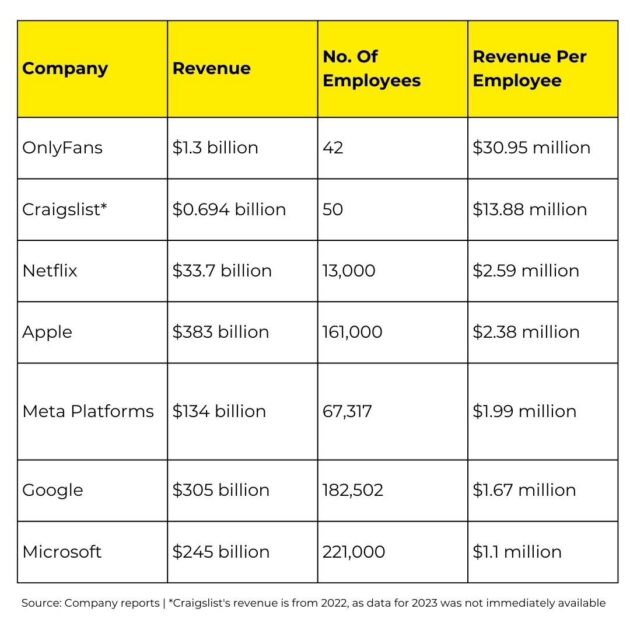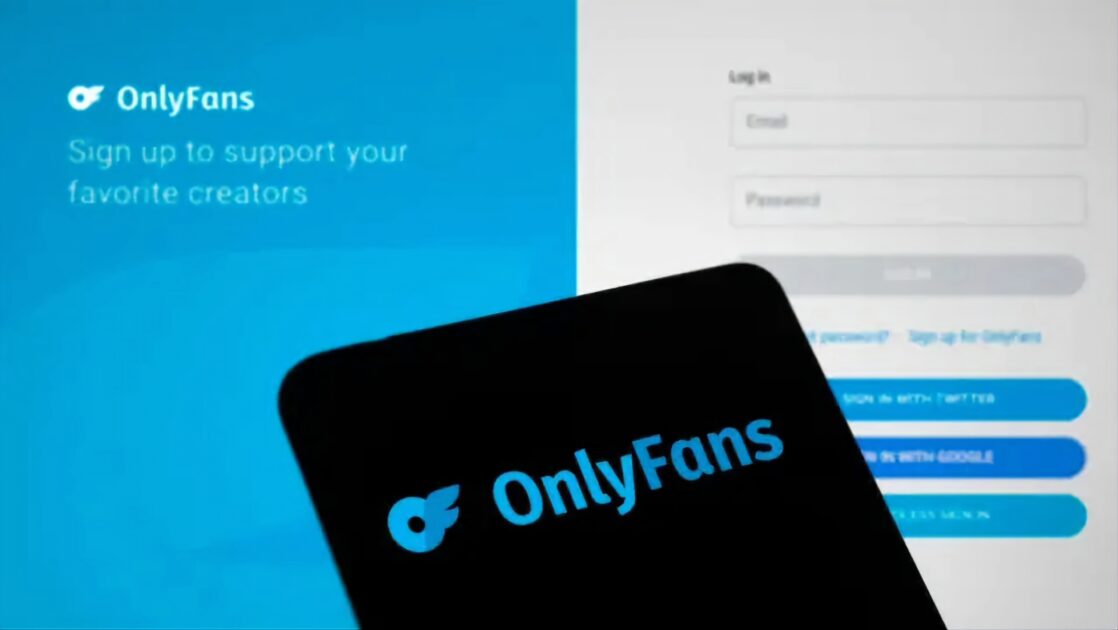How OnlyFans’ 42-Person Team is Generating More Revenue Per Employee Than Apple, Google, and Microsoft Combined
When it comes to revenue per employee, the tech industry’s biggest names—Apple, Google, and Microsoft—might seem unbeatable. But a surprising contender has quietly surpassed them all: OnlyFans.
The content-sharing platform, known for its gig-based approach, is redefining financial success with a lean team of just 42 employees driving a staggering $1.3 billion in annual revenue. This equates to nearly $31 million per employee—an efficiency metric 28 times higher than Microsoft’s, raising important questions about the future of work and digital business models.
OnlyFans’ Formula for Success
Unlike traditional tech giants, the content-sharing platform operates a decentralized, gig-based model that leverages its 2.1 million creators. These independent freelancers generate the bulk of the platform’s revenue by selling subscription-based, pay-per-view, and personalized content. The platform, in turn, takes a 20% commission on all transactions, according to its Terms of Use.
With over 190 million active users, the content-sharing platform focuses on platform maintenance, payment processing, and content moderation—key tasks that its small workforce handles efficiently. This allows the company to maintain an ultra-lean structure while riding the wave of the booming creator economy.
How Big Tech Measures Up
For comparison, Microsoft, Apple, and Google generate higher overall revenue but dilute their revenue-per-employee ratios due to their massive workforces. These companies manage vast internal ecosystems that include product development, sales, marketing, customer support, and more.

Apple, for instance, operates with a workforce of over 160,000 employees, generating around $2.3 million in revenue per employee. Microsoft’s ratio stands at approximately $1.1 million, while Google’s parent company, Alphabet, achieves about $1.5 million. These figures pale in comparison to the content-sharing platform’s efficiency.
Why OnlyFans Stands Out
OnlyFans’ success is a testament to the power of the gig economy and user-generated content. By relying on creators to produce and market content, the platform eliminates many of the overhead costs that traditional companies face.

This model also taps into the rising demand for personalized, flexible work—a trend reshaping industries worldwide. For creators, the platform provides an opportunity to earn significant income without the constraints of conventional employment.
The Bigger Picture: Are Tech Giants Bloated?
The vast discrepancy in revenue-per-employee highlights potential inefficiencies in the traditional tech model. Companies like Apple and Microsoft prioritize product ecosystems, research and development, and expansive marketing campaigns—strategies that demand large, salaried workforces.
In contrast, OnlyFans’ model demonstrates that smaller teams can achieve higher profitability by outsourcing key functions to independent contributors.
What This Means for the Future of Work
The rise of OnlyFans signals a potential shift in how companies operate. Lean, digital-first platforms that capitalize on freelance ecosystems could redefine traditional employment structures.
As businesses increasingly adopt platform-based models, the line between employees and independent contributors may blur. This could lead to a future where smaller internal teams manage extensive networks of freelancers, offering flexibility for workers and profitability for companies.
Will Big Tech Adapt?
Tech giants like Apple, Google, and Microsoft may soon face pressure to emulate OnlyFans’ efficiency. By integrating gig-based elements and streamlining their operations, these companies could enhance their profitability metrics.
But the question remains: will they embrace these changes, or will platforms like OnlyFans continue to lead the charge in redefining corporate success?
One thing is certain—OnlyFans’ approach is more than a financial anomaly. It’s a wake-up call for traditional businesses to rethink their structures in an increasingly creator-driven economy.
The Bottom Line
OnlyFans’ remarkable revenue-per-employee efficiency is a symbol of what’s possible in the digital age: lean teams, scalable platforms, and gig-powered ecosystems that thrive in a connected world. As industries evolve, OnlyFans may not just be a disruptor—it could be a blueprint for the future of work.










Join our Channel...